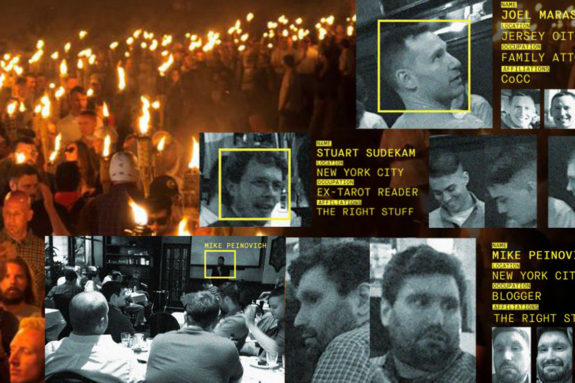What the We Company offers is commune as commodity.
Telemarketing is at the center of Boots Riley’s Sorry to Bother You but perhaps the film’s most prescient treatment of contemporary labor is its incorporation of the burgeoning co-living industry. As protagonist Cassius “Cash” Green, newly employed as a telemarketer, drives his rust bucket through a hard-up neighborhood, an advertisement affixed to the Sav-Mor Liquors announces: “WorryFree — If you lived here you’d be at work already!” The ad shows three people dressed in matching jumpsuits lying in a cramped tri-level bunk bed but nonetheless smiling like satisfied customers in a McDonald’s commercial. As the movie’s surreal and worry-packed climax approaches, WorryFree moves from the background to the center.
A 2018 Forbes article, “Could ‘Sorry To Bother You’ Really Happen?” gives the fictional company all the benefit of the doubt of a real one, not to mention endowing it with personhood: “WorryFree is a controversial company who promises lifelong security for workers who live and labor onsite under conditions of what many in the film’s world call modern-day slavery.” The titular question may read as a warning to most, but to an elite few it no doubt marks new frontiers of profit.
Not satisfied with just being your landlord, co-living companies like Pure, WeLive, The Collective, and Common, whose names definitely don’t make them sound like cults or really bad warehouse shows, also want to be your event planner, interior decorator, personal shopper, internet service provider, yenta, and, of course, stalker. Co-living companies sell pre-furnished private rooms connected to common kitchens, bathrooms, and meeting spaces where you and your pre-vetted roommates can participate in planned activities or share a cup of coffee from the ever-replenished kitchen. Your monthly bill, competitive with the prevailing market rate for luxury apartments in your city, includes utilities and in many cases gives you access to a network of other buildings around the country. Did your employer just transfer you to another city? Put in a request to your corporate co-living landlord, pack what few personal belongings you still have, and a furnished room in your new city will be waiting for you. No trawling Craigslist, no begging your friend with a truck to help you move your bed.
If there’s something you want that your co-living landlord did not provide, then there are companies like Rent the Runway or Fernish that provide clothes and furniture as a service. Unlike Rent-a-Center or Aaron’s, these companies do not charge usurious financing fees to fleece the poor. Instead, they charge their considerable fees for access to designer products. One young urban professional told Sapna Maheshwari of the New York Times that such an arrangement is desirable because: “I want nice things, but I’m also not going to drop thousands of dollars all at once on a bunch of things when I don’t know in a year if I’m going to be in the same place.”
Co-living sits at the end of a long capitalist process separating people from the land and each other equally, so that labor might flow effortlessly where it is needed. No one is in danger of mistaking the posh, midcentury-modern surroundings of Common’s residents with the lives of the typical laborer, traveling from town to town for work. Migrant workers are often some of the most exploited. From Bangladeshi and Nepalese workers in India to Indian laborers in Dubai and Mexican workers in the United States, the person who has to travel far away from family and friends for gainful employment is rarely treated well. They are subject to legal grey zones, have few personal possessions or creature comforts, and work grueling jobs that few others will take at any price.

Still, co-living doesn’t offer any of the wealth-accumulating opportunities that the truly wealthy seek out. Rather than owning a dozen different properties, living in only a portion of them, and using the rest as rent-accumulating financial instruments, co-living eliminates all forms of equity or tenure. Everything is rented which means as soon as you stop paying a monthly fee everything is taken away. The co-living resident is nothing more than a passthrough for capital, temporarily holding onto wealth as it moves from their boss’s bank account to their landlord’s.
In their never-ending quest for new means of profit accumulation, capitalists in the real estate sector have cooked up what journalist Ava Kofman calls “venture capital’s commune,” in an attempt “to monetize the emotional labor of everyday, non-digital life.” It is the additional value created through the transformation of everyday life into searchable, commodified data, coupled with the premium feel of a curated urban experience that makes co-living financially viable. “Instead of unresponsive landlords and the crapshoot known as Craigslist,” writes Kofman in Urban Omnibus in 2016, “co-living offers roommate-matching with ‘like-minded’ individuals, regular housekeeping, and community events.” Operating in major cities around the world, co-living companies sell inclusive packages that have more in common with an extended-stay hotel than an apartment. Perhaps more important to the capitalist project than a new profitable enterprise, however, is the way co-living makes it easy for working urbanites to pick up and move wherever the gig economy takes them.
_____
Almost a century ago, industrial capitalism used cheap mortgages to mold white workers into a reactionary class of petty-bourgeois suburban landowners. This tied their material interests to those of bankers and assured popular support for racial segregation amidst ever-increasing rents. This is still true today but now, for the first time ever, most of the human population is living in cities, often as either gig-economy freelancers, migrant workers, or jet-setting apparatchiks within transnational firms. To ensure that their bosses can extract from them as much value as possible, these urban workers experience a peculiarly piquant form of what Karl Marx called “freedom in the double sense.” For capitalism to function the worker must be free “to dispose of his own labor as his own commodity” and also “free of all the objects needed for the realization of his labor-power.” By owning as little as possible — renting everything, even personal possessions — workers who might have once secured their middle-class status through investment in real estate and other assets now become caricatures of the ideal, dispossessed, and footloose proletarian. With co-living, labor power begins to move as quickly and dynamically as money itself.
Of course, capitalists have long realized the efficiencies and profits inherent in combining the role of boss and landlord. With every wave of industrial revolution comes a new kind of company town: from railroad baron George Pullman’s eponymous town in Illinois to Facebook’s Willow Village in the Silicon Valley, the nation’s biggest companies have often built their own cities. In Pullman and its contemporaries, company managers also attempted to socialize their workers by inspecting and evaluating homes based on strict, Puritanical standards that were useful to keeping order on the shop floor. But playing landlord, let alone paterfamilias, is too much commitment for Silicon Valley firms who barely want to be employers, opting instead to subcontract most of their employees from third-party providers as projects demand. Rather than look to capitalists of yore, it seems increasingly clear that co-living is meant to do to housing what subcontracting did to the workplace: make things temporary and unpredictable for the worker and dynamic and cheap for the capitalist.
One of the biggest players in the co-living industry is The We Company, which seems to have mastered the inscrutable but vaguely utopian marketing language common to the industry. We, which as of the beginning of 2019 had received a total of $10.4 billion in loans from the Japanese venture-capital firm Softbank, has spread to over a hundred cities and branched out from its original model of leasing shared office spaces, now operating two WeLive-branded co-living spaces in New York and Washington, DC. It also runs charter schools called WeGrow, has launched a global syndicate of research labs dedicated to mining and agriculture, a real estate investment firm called ARK, various data analytics companies, and hospitality services. Grandiosity is par for the course among the startups The We Company hosts in its WeWork business incubator and office rental division, but few companies are as ambitious and diversified as We. It’s unsettling when an app developer claims to be tapping into the human psyche in order to disrupt an industry, but it is downright terrifying when a multinational company like We claims that its “guiding mission will be to elevate the world’s consciousness.”
_____
It is a familiar canard that communists want to make you share your toothbrush. Even this strawman, however, is an improvement on what capitalism has cooked up: renting your toothbrush for an ever-increasing monthly fee. Subscription-based business models like Netflix for movies, or Spotify for music, are becoming the norm wherever companies can game the future-value calculations. As Cherie Hu writes in Real Life the common term for this process,“Spotification,” after the commercially successful streaming platform, “has been used in contexts as far-ranging as real estate, automobiles, banking, and book publishing to refer to a commercial logic that prioritizes access over ownership, breadth over depth of consumption, and instant ease of use over more deliberate exploration as a prerequisite for enjoyment.” Lisa Picard, president & CEO of EQ Office, an investment company specializing in commercial real estate, recently told Commercial Property Executive, an industry trade magazine, that commercial real estate managers “bought way too much inventory,” like music consumers, and “rarely used all of it.” What her industry needed was a Spotify to come along and offer “more flexible solutions where the product is curated for us without having to hunt for the perfect solution that also requires a long commitment.”
For property managers, “more flexible solutions” looks like co-working and co-living: leasing smaller fractions of space — a single room, even a desk — for hours instead of years, often at significant markup. It’s like finding an industry where everyone is buying in bulk and you invent a way to sell at airport-retail prices. But the metaphor works on the demand side for housing as well: we all face a “long commitment” both in hunting for the perfect place to live and then entering into a months-long rental contract. Spotification can lower the cost of keeping your options open: in the same way you could never afford to own the entire Neil Diamond discography on vinyl but you can access all of it on Spotify, a monthly payment to We is a relatively cheap way to become bicoastal when compared to buying two condos.
_____
In the early phases of industrialization, Marx’s double freedom looked like a young person from the countryside dispossessed, through direct and indirect violence, of their traditional access to the land and subsequently forced to migrate to towns and cities in search of wage work. In this way, the former peasant lost access to land and to the peasant social relationships that provided shelter, food, and even identity outside the market, entering instead into a lifestyle where basic necessities had to be bought with money, which could only be acquired from an employer. This is how they joined the proletariat.
This process didn’t happen overnight. It took centuries, and required a total transformation of law and the state. Private property is not personal property, but personal property backed by the power of the state. New laws were required to define the new roles of ownership and land use.“Bloody legislation,” criminalizing vagrants and the work-shy, joined enclosure, enslavement, and dispossession, to form the proto-proletariat and make “every single person . . . the untrammeled owner of his capacity for labour.” Early on, the biggest problem for capitalists was too few workers not too many, and even those reduced to total destitution resisted the ignominy of capitalist labor at first. In order to get workers, capitalists both encouraged the construction of new housing near worksites and encouraged migration, producing cities.
By the turn of the twentieth century it had become clear to capitalists that those industrial cities were a powder keg of class conflict that needed to be diffused. One of David Harvey’s many contributions to Marxian geography is his ability to link changes in commodification of land and habitation to underlying changes in mass movements. As he writes, home ownership in postwar suburbia “changed the focus of community action towards the defence of property values and individualized identities, turning the suburban vote towards conservative republicanism.” In America, but also increasingly across the globe, what determines those property values is a mix of ethnic apartheid and zoning laws outlining who and what can go where. While owning your own home and the land on which it sits may be the most comfortable position to be in under capitalism, most homeowners also understand how capitalism punishes with its ostensible rewards. First, individual homeowners must do the kind of work that under any other land-tenure arrangement would be socialized, just so that their homes remain valuable commodities. Second, they must politically agitate for all the things that keep property values high — a policed color line and NIMBY (Not In My BackYard) land protections — even if it makes other necessities like food or transportation more expensive and rare. William Levitt, the property developer of the eponymous Levittown in Long Island, put it much more succinctly: “No man who owns his own house and lot can be a communist, he has too much to do.”

Ironically, it is Levitt’s words that cut directly to the contradictions of mass ownership of land through bank mortgage: such a system ensures that people need to work for money to pay the bank to continue living on the land they supposedly own. This widespread ownership creates another contradiction: owing the bank means you have to keep selling your labor for money, but it also makes the labor market less responsive to the needs of capitalists by tying workers to specific pieces of land. Labor can no longer so easily flow where it is needed, in imitation of the hypermobility of capital. In a time when the labor movement was still relatively powerful, like 1950s America, this trade-off was beneficial to capitalists because the workforce needed to be pacified through the debt risk and responsibilities of home ownership. But now, when the labor movement is weak (if recovering), these impediments to the mobility of labor are likewise obstacles to capital.
It follows, then, that suburbs today are quickly transitioning from reserves of racialized wealth to rented bedroom communities for the service workers that high-earning professionals demand in their legacy cities — baristas and escorts, dog-walkers and daycare workers. While the rich enjoy adult playgrounds of finely curated urban culture — a walk down a Parisian boulevard or an en vogue romp through the favelas of Rio — the rest of us are physically dispersed into the bland suburban fringe. One can see the shape of the shift for the working class — toward rent, and toward the suburbs — in two recent studies: a 2018 report from Berkeley’s Terner Center showed that between “2006 and 2016, more than 3.8 million additional households became renters of single family homes.” Today, according to another study from Harvard, a third of the United States’ forty-seven million rental properties are single-family detached homes.
These changing suburbs orbit some of the biggest metropolitan economies on the planet, each day inhaling and exhaling millions of commuters into lungs of asphalt and steel. In some of the biggest and wealthiest cities, what Saskia Sassen calls “global cities,” multinational corporations and their attendant specialized firms — legal, advertising, technical support — are becoming simultaneously more linked to each other through highly complex financial and bureaucratic relationships, and “increasingly disconnected from the broader hinterlands or even their national economies.” What emerges are a range of “transnational urban systems” — from globally operating corporations and transit hubs to legally-designated free-trade zones — that are indispensable to the economies of these cities but may work at odds with the larger economy of the nation. It is no surprise, then, that it is almost exclusively in global cities that Common and the We Company are setting up shop, offering what amounts to a Spotify subscription to as many places to work and sleep as you need.
_____
For leftists, the urbanization of the planet presents both opportunities and challenges. Cities have, historically, been the sites of mass movements and wealthy landlords are generally unsympathetic targets in cities where most people rent. Density itself presents the opportunity to meet people and form relationships based on identities and interests that are in the numerical minority and thus too dispersed anywhere else. Cities both cultivate the seeking-out of communal action and beckon to those looking to find their tribe.
Cities are places of risk, however, and quite notoriously so. Fitting into a city is only achievable through trial and error: knowing what you want in a roommate, developing coping mechanisms for stress, recognizing scams, and the serendipity of friendship all take time. Once finally achieved people are reluctant to start all over again in a new city. Co-living companies aim to grease the skids of fitting in by studying who you are so that they know what bedsheets you’ll like and who you can tolerate sharing a kitchen with. They offer a solution to these challenges precisely by commodifying the sense of belonging that capitalism strips from us. They may also try to change you in the process, if such an approach proves more profitable.
In Sorry to Bother You, co-living’s Faustian bargain looms over every character. WorryFree’s CEO Steve Lift is first seen on television saying that since his company’s tenant-employees don’t sign their life-long contracts under threat of physical violence, they cannot possibly be slaves. Later we hear that Cash’s uncle Sergio is considering signing with WorryFree, pressured by the impending violence of foreclosure. Toward the end of the movie, Lift himself is literally pointing a gun at Cash to get him to join WorryFree but as the well-compensated loyal opposition within the workforce. As the pressures of city life become unbearable, the convenience of slick co-living firms looks more and more like a glass of water in the desert. Or, more accurately, a bottle of Nestlé in Flint.
Renting instead of owning seemingly solves the same problems that collective ownership resolves. Co-ops, land trusts, and public housing all tackle housing unaffordability, the steep labor commitments required by private ownership, and the alienation at their source, by removing profit motives, dividing up socially reproductive labor, and allowing us to consider the value of a place beyond its market price. Co-living appears to do something similar, but it does this through the bundling of services, providing fringe amenities, and subsidizing it all by way of real-estate speculation and the commodification of personal information. Co-living is the commune upside-down.
Armed with an understanding of how double freedom is important to the project of capitalism, we can now make a sober assessment about the near future of urban housing. If co-living becomes even half as popular as home ownership, what will that world look like and how fast will it get here? Will co-living move downmarket, offering no-frills boarding for service workers unable to afford housing in legacy cities?
One answer might be the 800-room facility set to rise above the San Jose skyline in 2021. Called Starcity, its developer imagines “vertical neighborhoods” with 20 percent of the floor space devoted to communal spaces like kitchens, lounges, and an “honor library.” This “shared-living-space-cum-mega-dorm-for-emerging-adults,” as CityLab described it, is expected to have most people living there for more than a month but how long will that remain the case as the company grows and provides more spaces, offering seamless transitions between cities?
“Co-living companies aim to grease the skids of fitting in by studying who you are so that they know what bedsheets you’ll like and who you can tolerate sharing a kitchen with.”
While the We Company politely declined to answer questions about their climate-change projects and their views on the spotification of real estate for this story, it is nonetheless possible to learn a lot about their long-term plans by studying the prospectus they gave the SEC as part of the process for being listed on the New York Stock Exchange. As a genre these documents (called an S-1) are meant to convince the finance industry that the company is worth investing in. We, which had the option to file the whole thing confidentially, instead opted to announce publicly that the company will “change the world’s consciousness,” even though they have never been profitable and see a path to profitability only through massive capture of a market that doesn’t even exist. How big they must become is difficult to tell because the graphs that purport to describe their path to profitability conspicuously lack a y-axis with dollar amounts. What’s the difference between a million and billion anyway?
Not satisfied with pairing Brooklynites with a roommate who will also go to SoulCycle at 5:00 a.m., The We Company has, in fact, set its sights on cities themselves. Quartz reporter Simone Stolzoff wrote last March that as part of a “future cities initiative,” We aims to “create products and partner with local groups around the world to help address problems spurred by globalization, urbanization, and climate change.” It is easy to imagine these members-only WeCities surrounded by guarded gates to keep out climate refugees.
Given the co-living industry’s intellectual and geographic proximity to Silicon Valley, it also seems fair to assume that corporate surveillance and mass data collection will give co-living companies the tools to supercharge the gig economy. Our phones can already snitch on us to our employers, telling them where we are, what we are doing, and whether our work is of sufficient quality. Legal precedent, while still open to challenges, has largely allowed companies like Fiverr and Uber to treat their employees like independent contractors, thus releasing them from adherence to labor laws.
While not housing co-living facilities per se, Alphabet’s Sidewalk Labs is a smart city firm at the forefront of urban surveillance. Its projects in Toronto and New York City have raised questions about the nature of data collection in public space. For example, what does consent look like if a public square is being monitored by AI to serve contextually relevant ads? From here, it is a short leap to imagine what it means to have a city filled with co-living companies seeking out, verifying, and monitoring their respective subscribers.
But you don’t need to be so apocalyptic to see something dystopian in this scheme: a perverted realization of Marx’s double freedom, wherein subscribers get VIP access to not only a furnished apartment but an entire neighborhood. Within this sanctuary of capital, you might enjoy unprecedented convenience and luxury, paying for access to a network of para-state services with only a single WeNation bill. But the moment you lose your job you will be summarily kicked out, left to travel the Cursed Earth like Rob Schneider’s Fergie in Judge Dredd.
We can get a glimpse of what it will be like to live in a WeCity if we look at the way employees of companies that partner with WeWork to provide office space get treated. As WeWork gleefully declares on the Global Access product page of its website, “You’ll get a better understanding of how your mobile teams are utilizing their memberships with our up-to-date utilization reports. These reports let you know where your employees are, their activities, and how they use the space, giving you data to drive your decisions.”
Not all co-living companies seem so ready and willing to do this. Brad Hargreaves, CEO of Common, told me that “selling and/or sharing data with third parties is not something we do nor part of our business model.” Residents’ ages are “collected as a part of background checks before move-in and lease applications” and “gender is collected to help with members who may have a gender preference on who they share an apartment/bathroom with. We do not collect or actively know the racial makeup of our members.” When I asked if Common chooses house amenities based on what the company knows about its residents, or as part of marketing ventures, Hargreaves wrote that products are selected “based on quality, price, and aesthetic.”
This all seems like a long time coming. Before Boots Riley invented WorryFree, Neal Stephenson’s Snow Crash described private, militarized “burbclaves” and in the 2013 movie Elysium, the rich live in luxurious seclusion on a space station while the Earth burns below them. The difference of course is that authors of science fiction have long thought that opulent, private sanctuaries would be reserved solely for the rich. As it turns out, enclosures of this type can be useful at all levels of societies, so long as they do the job of maintaining workers’ double freedom. When Cash, newly freed from his hellish corporate job, has lunch with his comrades Salvador and Squeeze, Squeeze explains why the mere awareness of social problems does not breed mass uprisings: “If you get shown a problem but have no idea of how to control it, then you decide to get used to the problem.” The convenience and comfort of co-living seem uniquely suited to help us get used to the double freedom that binds us. People are, in the parlance of our time, burnt out. Co-living companies wager that between skyrocketing rent and dwindling wages, we’ll easily concede to a life well-subscribed. But only through a collective struggle in defense of our right to city can we, in the words of Salvador, “show them how to give fucks.”





